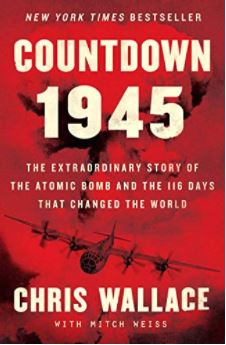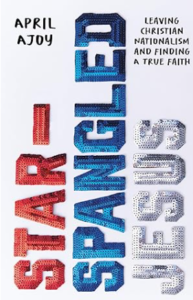After Franklin Roosevelt passed away the next President, VP Harry Truman, was told a secret. There’s “an immense project that was underway”, Secretary of War Henry Stimson told Truman, to develop “a new explosive of almost unbelievable destructive power.” Author Chris Wallace writes in his book Countdown 1945, “The project was so secret—and so potentially dangerous—only a handful of people knew about it.” The Manhattan Project employed over 130,000 people at a cost of nearly two billion dollars – and the Vice President didn’t know about it?? This surprised me, and I wanted to read more.
“(Truman) was shocked that a project of this size and expense, with plants across the nation, had remained a secret,” Wallace writes. I found Countdown 1945 fascinating with many behind the scenes details like this of the decision to drop the first Atomic Bomb.
Wallace details the differences of opinion among the US leadership on whether to drop the bomb or not. General Douglas MacArthur, commander of U.S. Army Forces in the Pacific, was against it. So was General Dwight Eisenhower, supreme commander of Allied forces in Europe. And there were doubts about the effectiveness of the weapon. “The bomb will never go off, and I speak as an expert in explosives,” Truman’s chief of staff told him.
My father served in Europe during World War II and he was always thankful the U.S. dropped the bomb on Hiroshima. “They would have sent me to fight in Japan,” he used to say. This viewpoint was valid, as Wallace relays the thinking of the time was that the Japanese were not going to surrender easily. “Even when the Japanese lost 100,000 of their 120,000 men on (Okinawa), and were obviously defeated, thousands of Japanese soldiers kept fighting, in many cases falling on their own grenades rather than surrender,” Wallace writes. “If the enemy fought that fiercely for Okinawa, what would they do to defend their homeland?”
OK, I get that argument. But why not give the Japanese a demonstration of the weapon, I had thought, without dropping it on a city? Truman’s Secretary of State James Byrnes warned “telling the Japanese where a bomb would be dropped would prompt them to move American prisoners of war to the area.” Clearly the decision to drop the bomb was not an easy one.
You may be left pondering, like I am, was the choice to drop the bomb worth it? For both sides of the issue, and for those interested in World War II history, Countdown 1945 is a must read.




